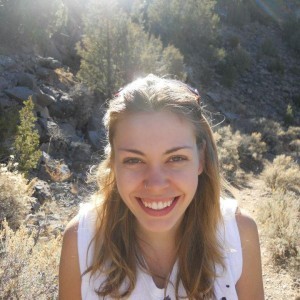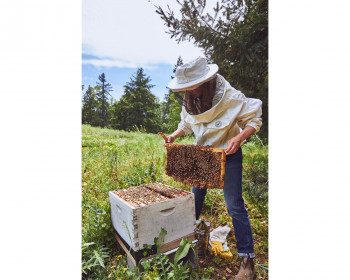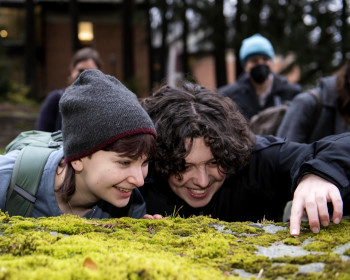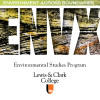ENVS Blog: A Fulbright Year in Colombia
Open gallery

Laura Schroeder (’14)
On a clear morning in August 2014, I peered out of a car window at sweeping Andean mountains speckled with grazing cows, rotund sheep, and farmers in bowler hats and ruanas, or thick wool ponchos. Soon, concrete buildings with tin roofs and large stenciled letters advertising the sale of arepas and empanadas appeared. This was where I would spend over a year, and I was not sure how my daily life in this new country would unfold.
I arrived in Tunja, Colombia, a small city roughly 2 hours north of Bogota, with few expectations. After all, everyone in my cohort had been warned repeatedly by Fulbright Colombia staff that it was best to begin the year without a fixed idea of what it would be like.
This turned out to be some of the best advice I received. I knew that I would be teaching English courses at a private university as well as engaging in a community engagement initiative or research project. In my application, I excitedly detailed plans to begin a youth environmental action club in which young members of the community learned about global environmental issues and connected them to local ones, ultimately creating initiatives revolving around sustainability in their own backyards. Sounds great, right?
Well, in practice it didn’t work out that way.
Long story short, my schedule didn’t coincide with those of my focus demographic. What is more, it was difficult to attract interest. Many young people already spent time working on family farms. They struggled to maintain their small businesses in the wake of strengthened relations between the U.S. and Colombian industrial agriculture. They cared for younger siblings or ailing grandparents or attended school Monday through Saturday in hopes of becoming a doctor one day.
My final project was vastly different from the one I originally conceived. Interviewing and photographing members of the informal economy, I created a website and photo gallery exhibit that explored how each person contributed to society. While a far cry from my initial project, this project also situated smallscale phenomena in a wider structural context.
Once again, I thought of how adjusting or sometimes completely scrapping plans is necessary and important.
In my ENVS classes, I came to realize this. A group project on urban beekeeping evolved from a focus on combating Colony Collapse Disorder locally to an analysis of public perceptions of swarming and fear of bees. My freshman E&D term paper on responses to flooding in Bangladesh led to an indepth exploration of international aid programs and local resilience in a course a couple of years later. In other courses I found myself going through a similar process.
This is not to say that making sweeping plans is futile. By all means, have a fixed idea of what you are doing. Plan. Prepare. Research. However, always be mindful of the fact that your plans could change. This does signify failure; on the contrary, it is central to examining complex issues and means of tackling them.
I feel that my education at Lewis & Clark has prepared me to navigate and capitalize on this process of letting my work evolve and complicating previous thoughts, ideas, and preconceptions. In discussing wicked problems and their multifaceted and often unexpected approaches throughout my years in the ENVS and SOAN programs, I have grown academically and personally.
My next step is graduate school, and I am applying to sustainable development and development practice/policy programs. I am particularly interested in the nexus of human/labor rights in Latin America and migration. At this point in my life, I am more excited than ever to grapple with the wicked problems in this big, beautiful, and fractured world.
More Environmental Studies Stories
Environmental Studies is located in room 343A of John R. Howard Hall on the Undergraduate Campus.
MSC: 62
email envs@lclark.edu
voice 503-768-7790
fax 503-768-7620
Symposium Advisor Jessica Kleiss
Environmental Studies
Lewis & Clark
615 S. Palatine Hill Road MSC 62
Portland OR 97219


